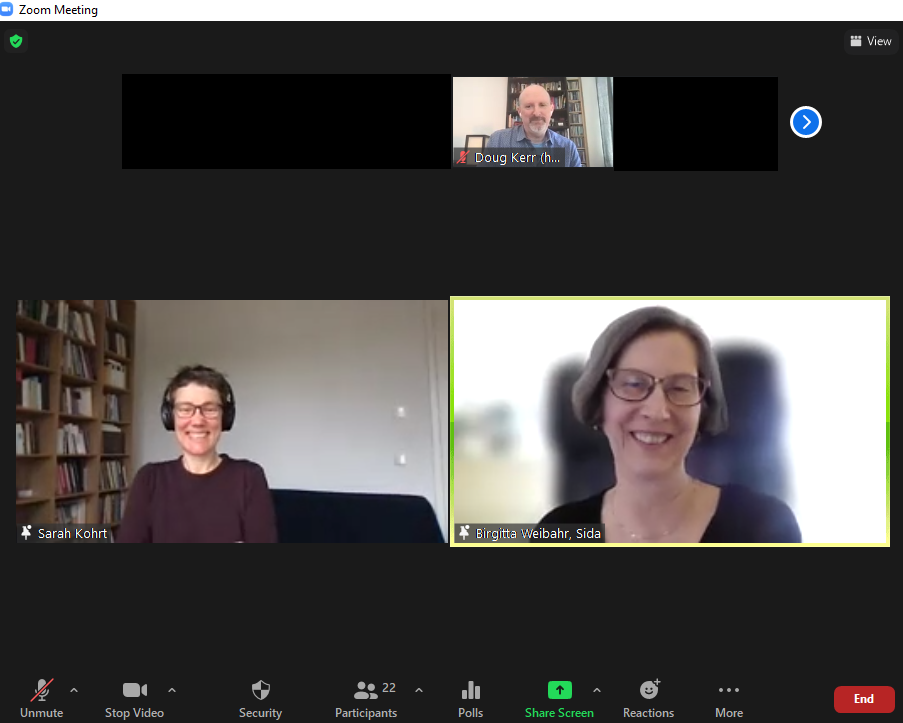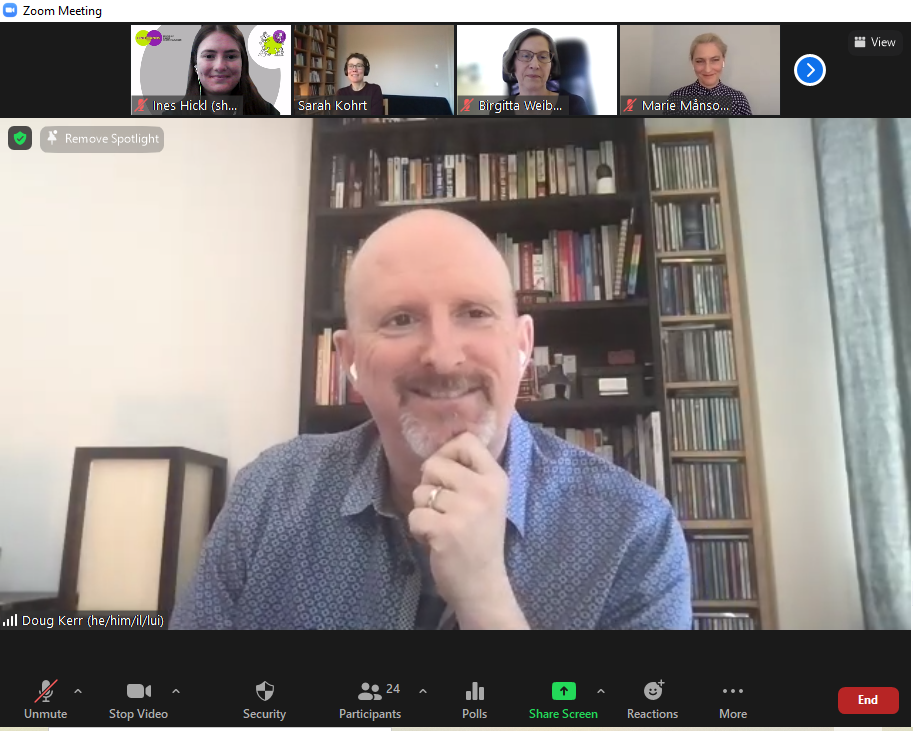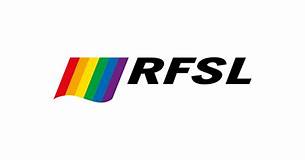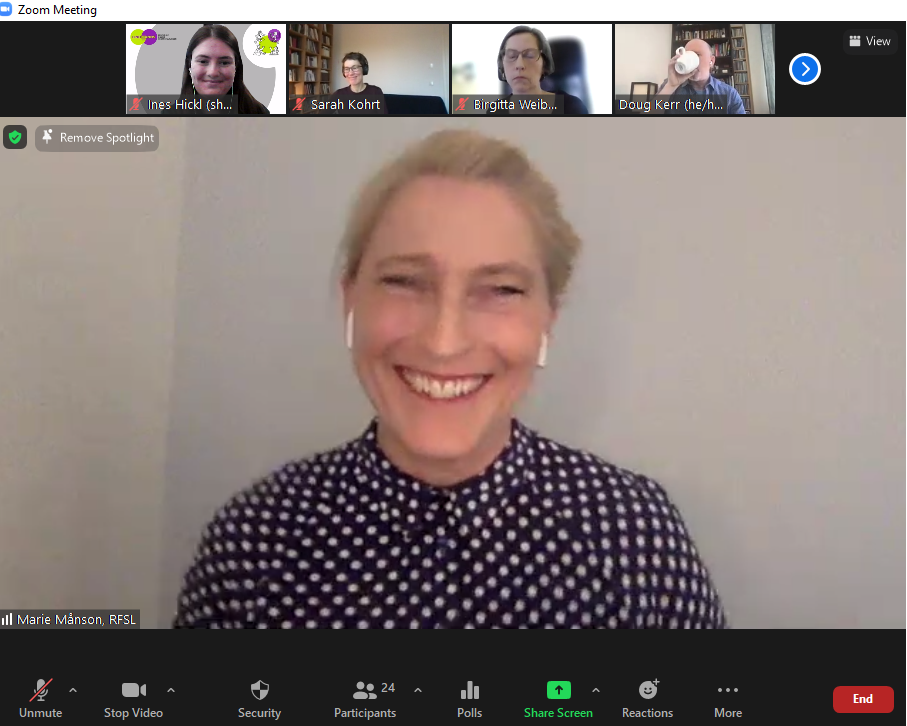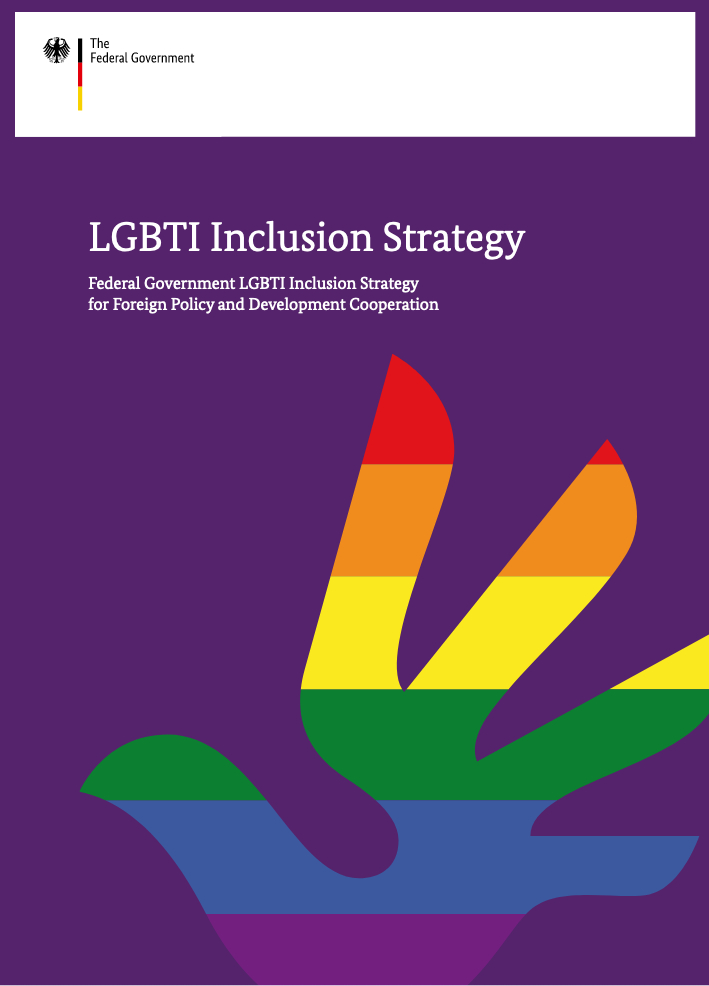Online talk with experts from Sweden and Canada
On 12 May 2021 the Hirschfeld-Eddy Foundation (HES) held an online talk about LGBTI inclusion in the development cooperation work of both Sweden and Canada. The event was hosted by Sarah Kohrt. The guests from Sweden were Birgitta Weibahr from the Swedish International Development Agency (Sida) and Marie Månson from the Swedish Federation for Lesbian, Gay, Bisexual, Transgender and Intersex Rights (RFSL). Doug Kerr, Executive Director of Dignity Network Canada, a coalition of Canadian organizations supporting LGBTI human rights, provided information from a Canadian perspective.
Use the experience gained by Sweden and Canada!
On 3 March 2021, following years of civil society advocacy by the Lesbian and Gay Federation in Germany (LSVD), the German federal cabinet finally approved the “LGBTI inclusion plan for foreign policy and development cooperation”. The online talk on experience gained by Sweden and Canada therefore focused on aims, content, commonalities, differences, challenges and perspectives regarding LGBTI inclusion in development cooperation. How have our Swedish and Canadian colleagues achieved and implemented their respective successes, what do these consist of, what obstacles have they faced, and how do they view the implementation of their goals thus far? These were the questions that were raised in connection with the German inclusion plan and its own implementation and evaluation.
Birgitta Weibahr explained that LGBTI projects played hardly any role in Swedish development cooperation before 2005, at most in a few programs on HIV prevention. That changed as of 2005, when LGBTI concerns were addressed and discussed thanks to intensive advocacy by civil society, first and foremost by the RFSL. When the inclusion plan came into effect in 2007, it represented a milestone in Swedish development cooperation.
2007: Inclusion of LGBTI in Swedish development cooperation
Everyone involved realized that this was an issue of human rights and democracy, and that debate had to focus on the problem of (in)visibility of LGBTI people in development cooperation. Instruments to increase visibility were needed. The human rights approach was productive, namely the idea that LGBTI rights are human rights which are universal and indivisible, so development cooperation also has to include and promote LGBTI projects. In addition, a multi-dimensional poverty analysis was helpful in exposing marginalized access to resources, equal opportunities and security, along with the associated injustice in power structures.
Sida held workshops and training to increase LGBTI visibility. The activities were part of an “Action plan on sexual orientation and gender identity in development cooperation” which resulted in improved institutionalisation of support for LGBTI people . The results of a 2014 study on Sida’s LGBTI work remain valid today. Support for LGBTI programmes and partners has increased enormously, according to Weibahr, with interventions currently focusing on advocacy, protection, security, empowerment, and building and strengthening social movements. Key factors for success include openness, involvement and commitment on the part of high-level politicians, commitment by specialists in the field of development cooperation, extensive dialogue about LGBTI topics in development cooperation, and ownership of agendas by local activists and NGOs that are also invited and consulted by embassies. Support in order to network local activists with global actors has been important.
2019: The Canadian LGBTI program
Doug Kerr talked about Dignity Network Canada (DNC), a coalition of more than 40 NGOs, and how it began working in 2015 when the new Liberal Party government led by Justin Trudeau took power. The amount of funding at the time was sobering, with the government providing only about two million Canadian dollars to LGBTI projects in its development cooperation work. The DNC staff was inspired by the Swedish and Dutch models which were providing considerably more funding. They asked what role their government should be playing in supporting LGBTI projects around the world as part of its foreign policy, development cooperation and refugee aid. They called for an intersectional approach and an LGBTI-inclusive look at Canadian foreign relations.

In February 2019 the Trudeau government announced that it would allocate 30 million Canadian dollars (more than 20 million euros) to strengthen LGBTI human rights over a period of five years. The program’s primary components are a “Canadian window” with 16.7 million dollars over six years, a “global window” with 5 million dollars over five years, and a “geographic window” with 15 million dollars over five years. The global window supports research projects, studies and multilateral forums, while the geographic window directly supports networks in the Global South. These three pillars have formed a network among government representatives and NGO activists, and placed a dual focus on practical experience and learning, as Kerr explained.
The program’s first component component to launch, however, is the Canadian window, which consists of a new Act Together for Inclusion Fund (ACTIF) administered by the DNC and Equitas, a human rights education organization. The first grants will be released in July 2021, and the projects will be selected by means of advisory and projectselection committees whose members include activists from the Global South. Above and beyond the LGBTI program’s level of funding, a strategy is needed to anchor LGBTI concerns sustainably in development cooperation, and also of course to encourage leading politicians to back the issue. One major challenge, Kerr notes, will consist of developing an overarching strategy that integrates foreign policy, development cooperation and embassy work, and that reflects these efforts back to Canada in order to strengthen domestic LGBTI rights – a coherency approach, in other words, for which the German model will be helpful.
Successful advocacy by the RFSL in Sweden
This mediating role is crucial in the sense that many partners are not that used to international funding and program planning, hence RFSL can facilitate and coach in a way that is difficult for a larger development agency. RFSL, as a peer organisation, additionally has understanding for the specific needs of different LGBTI-communities. Informal meetings are used to raise awareness of LGBTI concerns and language, and ensure that strategies and policies are always LGBTI-inclusive. The RFSL compiled and distilled the expertise to formulate guidelines for development cooperation (“Guiding Principles on the Inclusion of Lesbian, Gay, Bisexual, Transgender, and Intersex (LGBTI) People in Development Policy and Programs”). Månson calls for a systematic evaluation of the Swedish inclusion plan in order to acquire new perspectives on how LGBTI inclusion in development cooperation is functioning today. It is also very important to ensure humanitarian aid in LGBTI-inclusion work. Månson is pleased to see that this aspect is addressed in the German inclusion plan.
Marie Månson explained the role that the RFSL played in developing and implementing the Swedish inclusion plan, and continues to play. In 2006 Sida and the RFSL worked closely together in drawing up the inclusion plan. Some Sida staff members were instrumental in backing the project, and the RFSL ensured feedback from civil society and contributed expertise and concrete ideas. The RFSL is Europe’s second-oldest LGBTI organization and has an annual budget of three million euros. Its twelve-person international department does lobbying on the UN level, provides training for LGBTI activists from around the world, and coordinates how funds are channelled to partner organizations and their projects.
2021: Use the exemplary wording from the German inclusion plan!
All three experts agree that it is enormously important to identify high-ranking politicians and ministry personnel who take on the topic of LGBTI inclusion and openly support it. These contacts should be cultivated, and their proactive roles are essential for success. Also important are open dialogue and mutual respect among the different partners, as well as the necessity of finding suitable formats for regular, ongoing exchange of ideas. It will now be important to use the German inclusion plan, with its strong and exemplary wording, to acquire greater funding for LGBTI projects. What is needed is to identify good potential projects to support, as well as gaps in issues or geographic locations, and to concentrate on where help is most needed – while always doing so in close consultation with local activists. Månson advocates using the UN Sustainable Development Goals and their wording as a way to open doors, especially with politicians. This framework, and the promise to leave no one behind, are particularly well suited for reaching and convincing government figures in development cooperation.
Klaus Jetz
Hirschfeld-Eddy Foundation
More information:
- All blog articles under the tag “inclusion plan”
- Sweden: Swedish International Development Cooperation Agency (Sida)
- Policy framework for Swedish development cooperation and humanitarian assistance ‒ Government Communication 2016/17:60 (65 pages, PDF)
- Action plan for Sida’s work on sexual orientation and gender identity in international development cooperation 2007–2009: Sida’s work on Lesbian, Gay, Bisexual and Transgender issues in international development cooperation (PDF)
- Study on Sida’s work on human rights of lesbian, gay, bisexual, transgender and intersex persons (PDF)
- Canada: Dignity Network Canada
- Civil society calls for a government strategy – a chronology (2012–2021)
An event by the Hirschfeld-Eddy Foundation as part of the project: LGBTIQ Human Rights Defenders. Find out more about the project in our blog, tag MRV-2021



